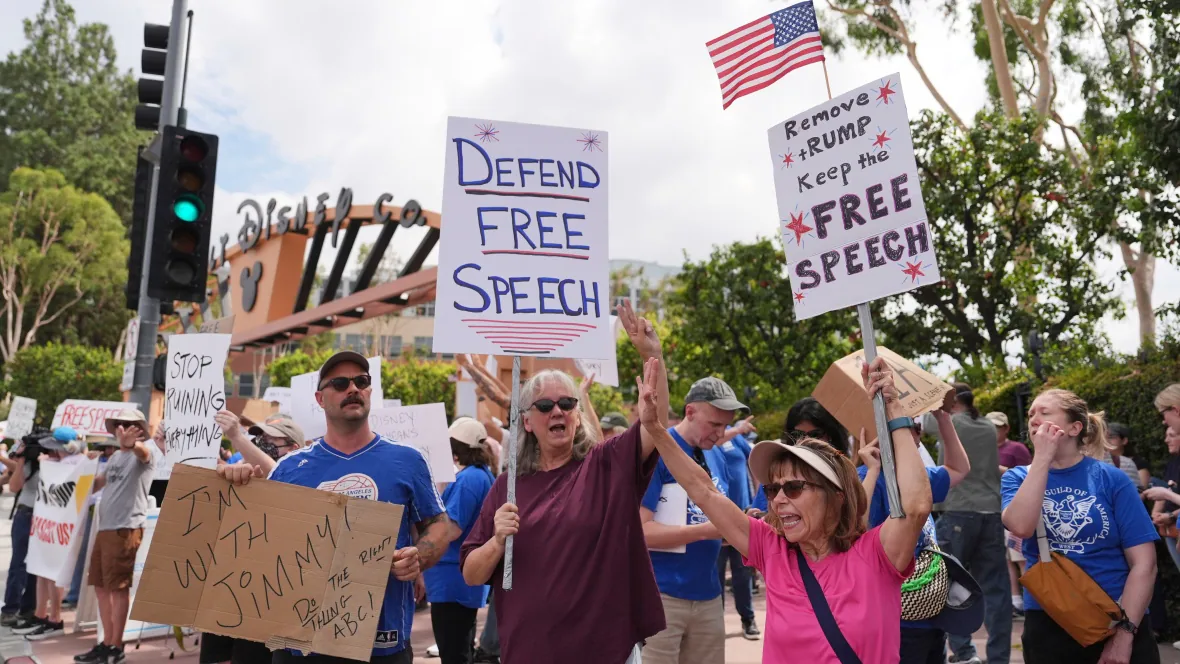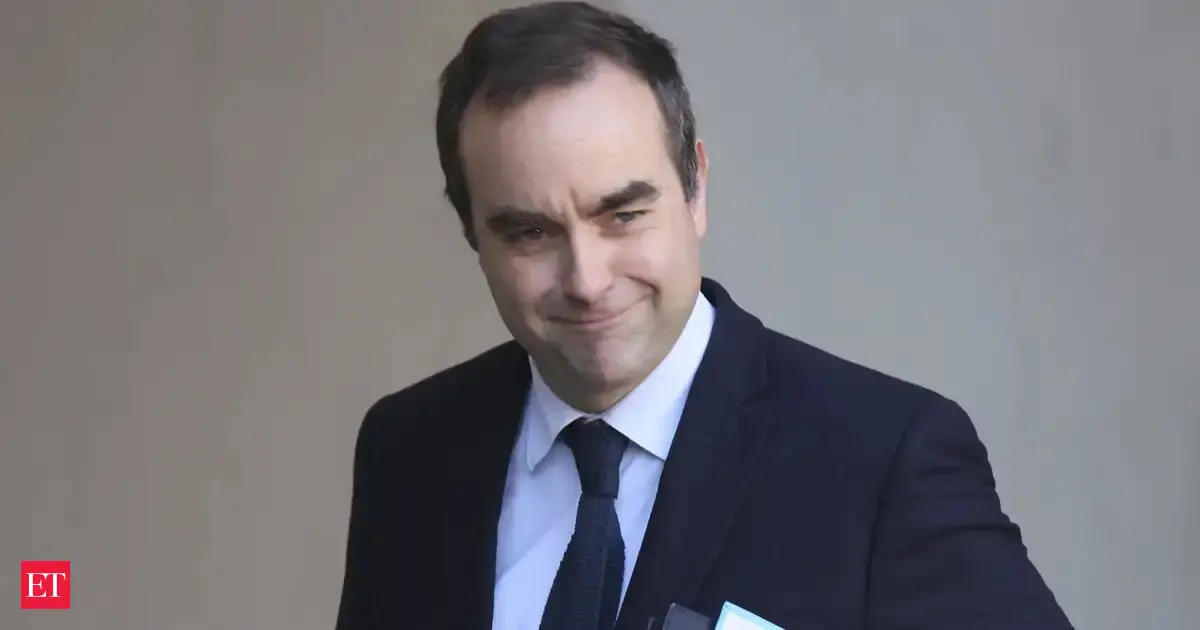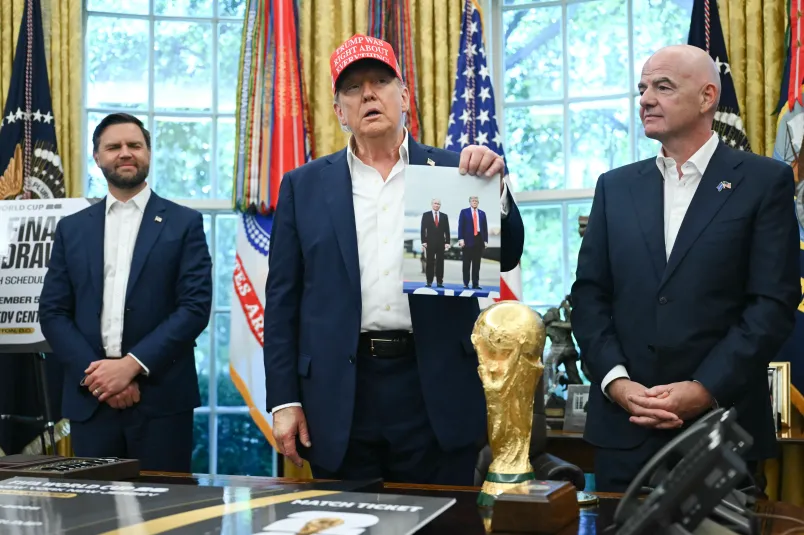By Mike Crawley
Copyright cbc

ABC’s decision to pull late-show host Jimmy Kimmel off the air marks what observers see as an escalation in a campaign by U.S. President Donald Trump and his allies to pressure media critics into silence.
The network announced it was indefinitely pre-empting Jimmy Kimmel Live!, just as taping of the show’s Wednesday night episode was about to begin, after Kimmel came under fire for a line in a monologue that referenced the man accused of killing prominent Trump supporter Charlie Kirk.
This follows a series of multibillion-dollar lawsuits by Trump against major news outlets, as well as CBS’s announcement that it’s cancelling The Late Show with Stephen Colbert, another comedian who frequently skewers the president.
It’s all prompting concerns from free-speech activists that the White House is cracking down on Americans’ cherished First Amendment rights by putting financial, legal and regulatory pressure on media companies.
What happened to Kimmel “fits into a pattern” of the administration trying to punish news outlets and media personalities who criticize Trump and his policies, says Conor Fitzpatrick, a senior attorney with the Foundation for Individual Rights and Expression, a Washington-based advocacy group.
“These are dark times for free speech in the United States,” Fitzpatrick told CBC News in an interview.
“This administration believes that they can decide what the public should be able to hear, and that should strike fear in every American who values free speech,” Fitzpatrick said.
ABC gave no reason for its move, but it came mere hours after the Trump-appointed chair of the Federal Communications Commission, the U.S. broadcast regulator, blasted Kimmel for saying many in Trump’s MAGA movement were trying to portray Kirk’s alleged killer “as anything other than one of them.”
FCC chair Brendan Carr called on the network’s affiliates to stop airing Kimmel’s show and floated the idea of fining uncompliant TV stations or revoking their broadcast licences.
‘Should have fired him a long time ago’
Trump, who has for years expressed his desire for Kimmel to be sacked, is denying that the comedian’s removal from the airwaves is a free-speech issue.
“Jimmy Kimmel is not a very talented person,” Trump said Thursday in response to a reporter’s question during his state visit to the U.K.
“They should have fired him a long time ago. You can call that free speech or not; he was fired for lack of talent.”
There’s no evidence that Kimmel’s talent or his show’s ratings had anything to do with ABC’s decision to stop airing the show.
Instead, media commentators and Trump’s critics are connecting ABC’s decision directly to pressure from the Trump administration and calling it censorship.
‘That’s state speech control’
What transpired with Kimmel is “essentially saying that any media actor that doesn’t say what Trump wants them to say, about Charlie Kirk or Trump’s policies, is going to be silenced,” said Connecticut Sen. Chris Murphy, a Democrat, at a news conference Thursday.
“That’s censorship. That’s state speech control. That’s not America,” said Murphy.
Comedian and podcaster Pete Dominick says the White House “used the tragic assassination of Charlie Kirk as an excuse” to muzzle its critics.
“Make no mistake, this is government censorship,” Dominick said Thursday in an interview on CBC News Network. “This is what authoritarianism looks like.”
ABC and its parent company Disney were “threatened with consequences by a government official,” said journalist and former George W. Bush speech writer David Frum on CNN. “It’s state repression.”
Before the company announced its move to pull Jimmy Kimmel Live! from the network, Nexstar Media Group, which owns broadcast outlets across the U.S., announced it would no longer air the show on its 32 local ABC affiliates, calling the comedian’s comments “offensive and insensitive.”
Trump has personally launched a string of hefty lawsuits that critics have slammed as frivolous attempts to stifle legitimate journalism:
He’s suing the New York Times for $15 billion US over what his lawyers claim is a “decades long-pattern … of intentional and malicious defamation.” He’s suing the Wall Street Journal for at least $10 billion US over its reporting that Trump had written a suggestive 50th birthday letter to Jeffrey Epstein, before the disgraced financier was convicted of sex offences. Last year he sued Paramount, the parent company of CBS, for $10 billion US, alleging the show 60 Minutes deceptively edited an interview with his then-opponent in the presidential election, Kamala Harris.
Paramount announced a settlement in that lawsuit in July, pledging $16 million US to Trump’s future presidential library.
Two weeks later, CBS announced its plan to cancel Colbert’s show, and a week after that, the FCC approved Paramount’s $8.4-billion US merger with Skydance Media.
“We have to straighten out the press,” Trump said last December in response to question about other lawsuits he’d filed against media outlets before his inauguration.
Less than a month after Trump took office, the administration banned reporters of the Associated Press from access to Oval Office events after the country’s largest news wire service refused to call the Gulf of Mexico the “Gulf of America” in its stories. Trump had issued an executive order to change the name.
Earlier this week, even before Kimmel’s show was taken off the air, free-speech activists were expressing concern about efforts by the Trump administration and his allies to police commentary about Kirk, an at-times controversial conservative activist who also staunchly defended the right to free speech.
Advocacy group PEN America described a “McCarthy-esque crackdown on free expression” in the wake of Kirk’s killing.
High-ranking government officials “have fanned the flames of this campaign and proposed to use the power of their offices to punish free thought,” said PEN staffers Jonathan Friedman and Elly Brinkley in an online commentary.
“They have used Kirk’s murder as a pretext to crack down on speech in clear violation of the First Amendment.”



